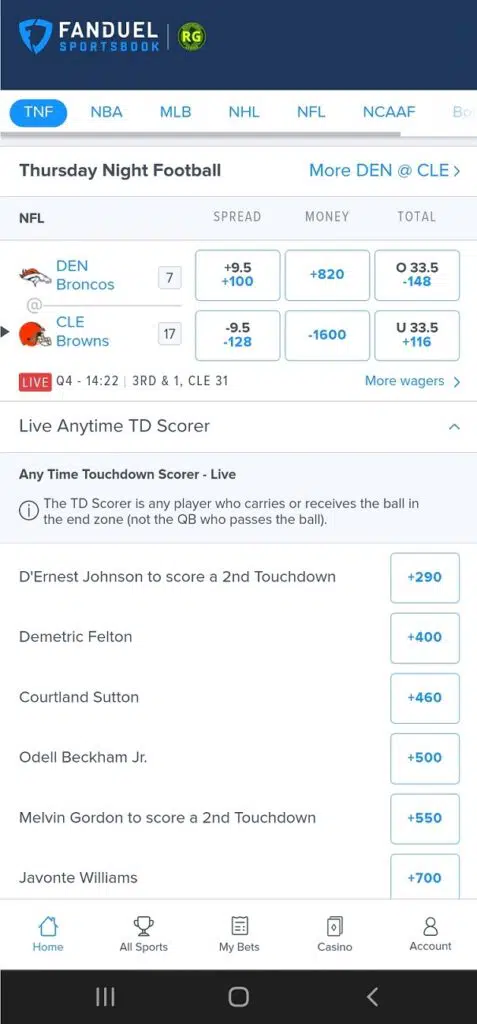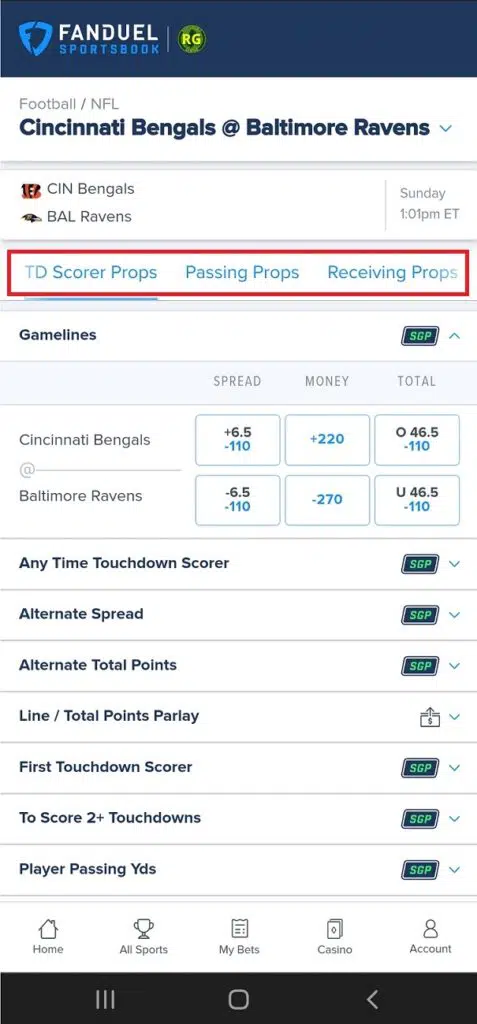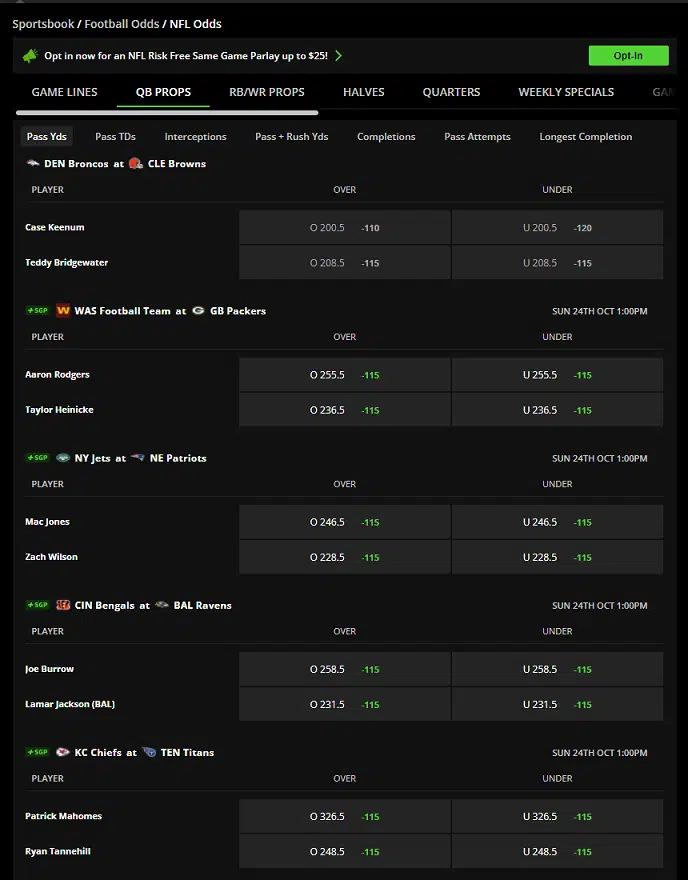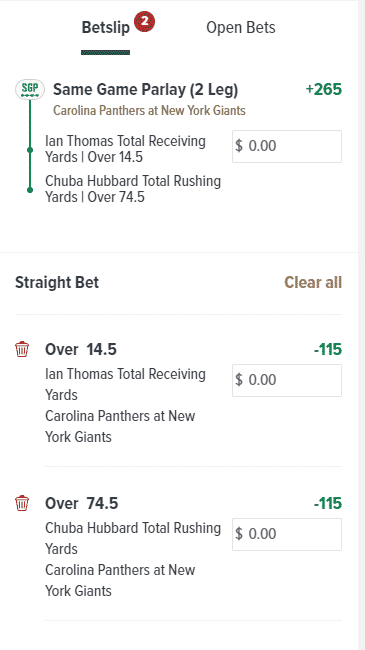Prop bets have evolved from a rare courtesy offered by Las Vegas sportsbooks to a centerpiece of the sports betting industry over the past few decades.
Their popularity stems from an increasing desire among bettors to wager on more than just the outcome of a game. And sportsbook operators are happy to oblige because more bets equal more action.
Today, prop bets comprise the majority of betting markets on legal betting apps, and their reach expands with every passing year.
Props also present unique opportunities for savvy bettors, who realize bookmakers can’t possibly post accurate lines for hundreds of novelty bets.
So, what is a prop bet, and how exactly should bettors approach sports props?
Prop Betting Sites
 $1500 In Bonus BetsBetMGM Bonus Code: BUSABONUS
Gambling problem? Call 1-800-GAMBLER (available in the US). Call 877-8-HOPENY or text HOPENY (467369) (NY). Call 1-800-327-5050 (MA). 21+ only. Please gamble responsibly. Call 1-800-NEXT-STEP (AZ), 1-800-BETS-OFF (IA), 1-800- 981-0023 (PR). First bet offer for new customers only. Subject to eligibility requirements. Bonus bets are non-withdrawable. In partnership with Kansas Crossing Casino and Hotel. See BetMGM.com for terms. US $1500 promotional offer not available in New York, Nevada, Ontario, or Puerto Rico.
$1500 In Bonus BetsBetMGM Bonus Code: BUSABONUS
Gambling problem? Call 1-800-GAMBLER (available in the US). Call 877-8-HOPENY or text HOPENY (467369) (NY). Call 1-800-327-5050 (MA). 21+ only. Please gamble responsibly. Call 1-800-NEXT-STEP (AZ), 1-800-BETS-OFF (IA), 1-800- 981-0023 (PR). First bet offer for new customers only. Subject to eligibility requirements. Bonus bets are non-withdrawable. In partnership with Kansas Crossing Casino and Hotel. See BetMGM.com for terms. US $1500 promotional offer not available in New York, Nevada, Ontario, or Puerto Rico.
 Bet $5 Get $300FanDuel Promo Code: Not Needed
Gambling Problem? Call 1-800-GAMBLER or visit RG-Help.com. Call 1-888-789-7777 or visit ccpg.org/chat (CT). Hope is here. GamblingHelpLineMA.org or call (800) 327-5050 for 24/7 support (MA). Visit www.mdgamblinghelp.org (MD). Call 1-877-8HOPE-NY or text HOPENY (467369) (NY). 21+ (18+ D.C.) and present in select states (for KS, in affiliation with KS Star Casino). First online real money wager only. $5 first deposit required. Bonus issued as nonwithdrawable bonus bets which expire 7 days after receipt. Restrictions apply. See terms at sportsbook.fanduel.com.
Bet $5 Get $300FanDuel Promo Code: Not Needed
Gambling Problem? Call 1-800-GAMBLER or visit RG-Help.com. Call 1-888-789-7777 or visit ccpg.org/chat (CT). Hope is here. GamblingHelpLineMA.org or call (800) 327-5050 for 24/7 support (MA). Visit www.mdgamblinghelp.org (MD). Call 1-877-8HOPE-NY or text HOPENY (467369) (NY). 21+ (18+ D.C.) and present in select states (for KS, in affiliation with KS Star Casino). First online real money wager only. $5 first deposit required. Bonus issued as nonwithdrawable bonus bets which expire 7 days after receipt. Restrictions apply. See terms at sportsbook.fanduel.com.
 Up to $1000 in Bonus BetsFanatics Sportsbook Promo Code: Not Needed
Must be 21+. GAMBLING PROBLEM? Call 1-800-GAMBLER
(CO/DC/IL/KS/KY/LA/MD/OH/MI/NC/NJ/PA/TN/VA/VT/WV/WY), (800)-327-5050 or http://gamblinghelplinema.org (MA), Call (877-8-HOPENY) or text HOPENY (467369) (NY), 1-800-NEXT-STEP or text NEXTSTEP to 53342 (AZ), (888) 789-7777 or http://ccpg.org (CT), or 1-800-BETS-OFF (IA), or 1-800-9-WITH-IT (IN), or www.mdgamblinghelp.org (MD), or morethanagame.nc.gov (NC), or 1800gambler.net (WV). $1,000 No Sweat Bets offer for customers in AZ, CO, CT, DC, IA, IL, IN, KS, KY, LA, MA, MD, MI, NC, NJ, OH, PA, TN, VT, VA, WV, or WY only. Must apply this promotion in your bet slip and place a $1+ cash wager with odds of -500 or longer each day for 10 straight days. Your 10 days begin the day you establish your account. Wager must settle as a loss to qualify for Bonus Bets. Bonus Bets will equal the amount of the losing wager(s) (up to $100 in Bonus Bets per day) and expire 7 days from issuance. This offer is not available in IL, NY, & NC. Terms apply- see Fanatics Sportsbook app.
Up to $1000 in Bonus BetsFanatics Sportsbook Promo Code: Not Needed
Must be 21+. GAMBLING PROBLEM? Call 1-800-GAMBLER
(CO/DC/IL/KS/KY/LA/MD/OH/MI/NC/NJ/PA/TN/VA/VT/WV/WY), (800)-327-5050 or http://gamblinghelplinema.org (MA), Call (877-8-HOPENY) or text HOPENY (467369) (NY), 1-800-NEXT-STEP or text NEXTSTEP to 53342 (AZ), (888) 789-7777 or http://ccpg.org (CT), or 1-800-BETS-OFF (IA), or 1-800-9-WITH-IT (IN), or www.mdgamblinghelp.org (MD), or morethanagame.nc.gov (NC), or 1800gambler.net (WV). $1,000 No Sweat Bets offer for customers in AZ, CO, CT, DC, IA, IL, IN, KS, KY, LA, MA, MD, MI, NC, NJ, OH, PA, TN, VT, VA, WV, or WY only. Must apply this promotion in your bet slip and place a $1+ cash wager with odds of -500 or longer each day for 10 straight days. Your 10 days begin the day you establish your account. Wager must settle as a loss to qualify for Bonus Bets. Bonus Bets will equal the amount of the losing wager(s) (up to $100 in Bonus Bets per day) and expire 7 days from issuance. This offer is not available in IL, NY, & NC. Terms apply- see Fanatics Sportsbook app.
 Bet $5 Get $100Bet365 Bonus Code: BETUSAGAMBLING PROBLEM? CALL OR TEXT 1-800-GAMBLER (AZ, CO, IL, IN, KY, LA, NC, NJ, OH, PA, VA), 1-800-BETS OFF (IA) or 1-800-889-9789 (TN). 21+ only (18+ in KY). Must be present in AZ/CO/IA/IL/IN/KY/LA (select parishes)/NC/NJ/OH/PA/TN/VA. New Customer Offer Bet $5 and Get $100 in Bonus Bets at bet365. *Subject to meeting qualifying criteria. Minimum wager $5. Minimum odds -500 or greater. $10 minimum deposit. Paid in Bonus Bets. Bonus Bets wager excluded from returns. New customers only. Available in app only, time restrictions and T&Cs apply.
Bet $5 Get $100Bet365 Bonus Code: BETUSAGAMBLING PROBLEM? CALL OR TEXT 1-800-GAMBLER (AZ, CO, IL, IN, KY, LA, NC, NJ, OH, PA, VA), 1-800-BETS OFF (IA) or 1-800-889-9789 (TN). 21+ only (18+ in KY). Must be present in AZ/CO/IA/IL/IN/KY/LA (select parishes)/NC/NJ/OH/PA/TN/VA. New Customer Offer Bet $5 and Get $100 in Bonus Bets at bet365. *Subject to meeting qualifying criteria. Minimum wager $5. Minimum odds -500 or greater. $10 minimum deposit. Paid in Bonus Bets. Bonus Bets wager excluded from returns. New customers only. Available in app only, time restrictions and T&Cs apply.21+ to Play, T&Cs Apply. Gambling Problem? Call 1-800-GAMBLER
Prop Bets Explained
Put simply, prop bets – otherwise known as proposition bets – are wagers not directly tied to a game outcome or season-long result. If it’s not a point spread, total, moneyline, or future, it’s probably a prop bet.
Modern sports fans want to wager on more than just the outcome of the next game. They want to bet on their favorite players, teams, and what will happen in the 1st quarter, or even the opening drive of a football game. Props satisfy that craving.
Props commonly ask YES/NO type questions, and these questions range from pedestrian, like “How many total points will the home team score?” to exotic, such as “What color will the Gatorade shower be?”
As the prop market has grown, several prop subdivisions have emerged, each sharing certain characteristics but also exhibiting key distinctions.
Game Props
Game props are often derivatives of full game bets. As long as the wager doesn’t revolve around an individual player performance, it’ll probably fall in the game prop bucket.
For instance, NFL and NBA bettors can wager on the 1st half spread and moneyline or the 2nd quarter total. Other sportsbooks take game props a step further and offer more exotic bets like:
- Will there be a safety or a successful 2-point conversion?
- How many 3rd downs will both teams successfully convert in total?
- What will be the largest lead of the game?
- What will be the last scoring play of the first half?
- How many total field goals will there be?
- What will be the exact score after two innings?
The list goes on, and as demand grows, books must become more imaginative with each passing season to keep up with the competition.
Team Props
As the name implies, team props pose questions tailored around team performance. Common examples include total team touchdowns or field goals in an NFL game and team rebounds or assists in an NBA game.
Other team prop examples include:
- Which team will score the first touchdown? (NFL)
- Which team will reach 30 points first? (NBA)
- Will a team finish with an odd or even number of runs? (MLB)
Player Props
The application of data analytics to professional sports has increased in prominence among fans, and as a result, their interest in betting on player statistics has also spiked.
Sportsbooks capitalize on the demand by offering dozens of prop bets on individual players, with an emphasis on critical positions in football (QB, running back, etc.), baseball (pitcher, power hitter), and celebrities in other sports, such as Lebron James in the NBA.
Standard player props may cover questions such as:
- How many passing yards or passing touchdowns will a QB have?
- Will a star wide receiver have over or under 7.5 receptions?
- How many assists will a player have in his next NBA game?
- How many strikeouts will a pitcher have?
The scope of player props varies among sportsbooks, with the more aggressive books offering player props on just about every statistic or combination of statistics.
Exotic Props
Novelty props are less common than other types of proposition bets. Bettors find exotic props most often during the run-up to high-profile events like the Super Bowl.
Exotic Super Bowl prop bets have little to do with the actual game. Instead, they’re wagers on minute details surrounding the event. Examples include:
- What will be the length of the national anthem?
- Will the coin toss come up heads or tails?
- What color of Gatorade will the winning team pour on its coach?
- Who will be crowned the Super Bowl MVP?
- How many times will the camera pan over to the head coach?
Exotic prop bets can even extend to non-sporting events like the Oscars and political elections, although wagering on the latter is not yet permitted in the United States.
How to Place Prop Bets Online
Bettors can find the greatest abundance of sports betting props via legal betting apps and online sportsbooks. Finding and placing props is easy, although the process varies slightly from one sportsbook to the next.
We’ll use FanDuel Sportsbook as an example since it offers more proposition bets than just about any of its competitors:
- Log in to the FanDuel sports betting app or website
- Navigate to a sport that’s likely to feature a wealth of prop bets, typically NFL, NBA, MLB, college football, or college basketball – FanDuel and other sportsbooks also often list popular in-play props directly on the homepage
- Tap or click a game, and visit the “props” tab, usually near the top of the game page
- Select a prop category (passing props, rushing props, player props, etc.)
- Tap or click a prop bet to add it to the bet slip and select an amount to wager
Bettors can expect to find quirks in how each sportsbook manages and displays prop bets. For example, when users select “QB Props” on DraftKings Sportsbook, the app displays quarterback props available for every game in the NFL. In other words, DraftKings filters by prop category first and game second, whereas most other sports betting apps do it the other way around.
Are Props Good Bets?
Props are a sportsbook’s best friend and worst nightmare.
Proposition bets usually derive from an efficient line, often a total or point spread. For instance, if an NFL game total is 54 and the spread is +2.5 / -2.5, it stands to reason that both quarterbacks will be piling up a lot of passing yards. Thus, QB totals props will skew high.
However, there is less certainty that one QB will have a big game than there is both teams combining for a ton of points. More novel props are subject to even greater degrees of uncertainty because the correlations with efficient lines are loose.
Additionally, props are in such high demand that books have to offer more of them to remain competitive. With more props comes a greater likelihood of errors.
Oddsmakers account for this uncertainty with several methods. First, sportsbooks juice props more than other lines. Whereas -110 American odds are industry standard on point spreads and totals, YES/NO prop bets skew more toward -115 or even -118.
In addition, prop betting limits are often low – sometimes laughably so. For example, if a sportsbook limits a bettor to $1,000 max on point spread wagers, it might restrict that same player to $50 on props. In some cases, the limit can be as low as $5 or less.
Finally, some books offer one-way props. Whereas two-way props are YES/NO questions, one-way props only allow bettors to bet on YES. Bookmakers know the public’s tendency to bet on favorites and overs, so they use one-way props as a vehicle to squeeze a bit extra out of their customers.
All that said, props are still highly beatable, more so than any other betting market. Sometimes all it takes is a bit of line shopping to find a book that offers drastically different prop prices than its peers. Always shop around when scouring prop markets.
Another tip is to see how prop markets react when primary lines move. For example, if an NBA game total drops by 3.5 points due to a player injury, and correlated props don’t move accordingly, it may be time to pounce.
Just be cognizant that books don’t post their prop menu until well after the primary lines go live. This could mean Wednesday or Thursday for NFL Sunday games or the late morning on game day for NBA. Books may decide only to post few if any props for smaller markets like lesser-known college sports conferences.
Prop Betting FAQ
Robert Dellafave is an expert sports bettor, professional gambler, and advocate for the fair treatment of sports bettors.




